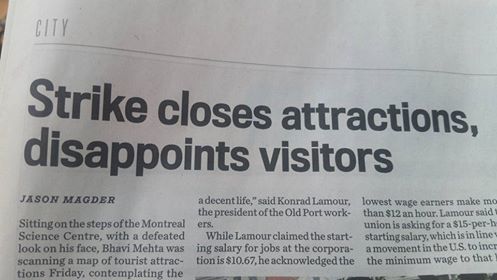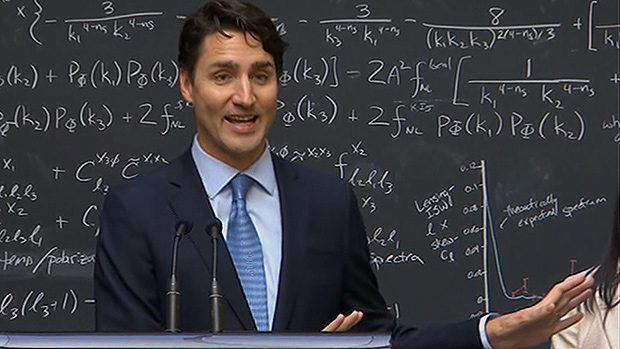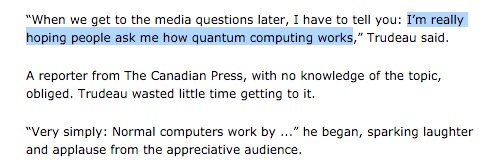Bock-Côté garde toujours ses critiques les plus virulentes pour la gauche impuissante. On apprend aujourd’hui que QS, un parti systématiquement ignoré et traité comme pas sérieux, serait «le parti chouchou des journalistes» (!). Ensuite, on dit aux lecteurs du JdeM, qui seraient peut-être intéressés par le programme économique de QS, que QS représente, au final, le «multiculturalisme pur et dur pro-niqab». De plus, un parti qui insiste à avoir des porte-parole plutôt que des chefs aurait une «fâcheuse tendance autoritaire». Et malgré leur respect des règles du jeu électoral/parlementaire, règles qui garantissent l’obscurité du parti, les solidaires seraient même «prêts à prendre tous les moyens pour imposer» leur programme.
Cracher à gauche
Framing
Old Port workers on strike. Typically, the media is covering it through the lens of “honest working people” inconvenienced by the strike. Whenever there’s a strike, the news value is the inconvenience to others — traffic, delays, services closed. Why workers are on strike, what’s at stake, etc., either goes unmentioned or is buried deep in the story. Context is a secondary concern. It’s not accidental. Just as it’s not accidental that newspapers and news programs have business sections/segments but not a labour section.

This framing, introduced by the media and replicated in our everyday conversations, is what makes solidarity all but impossible. Instead of supporting teachers or nurses, we reflexively spit on them for inconveniencing our vacation, for having better working conditions than ours, etc. Instead of seeing their gains as inspiration for what we could do in our own workplace, we see them as unjust (“I don’t have x benefit at my job!”) and we seek to strip them of their “excessive” benefits, to bring them down to our level of insecurity.
“I don’t have what you have so I wanna take it away from you.” Should be instead: “what you have is awesome, I’m gonna fight to get it too.” This intra-class jealousy is devastating for class solidarity. “Bus drivers make more than me! Fuck his strike! I’m gonna be late for work!”
What the people want
Professional reporters and editors provided extensive coverage of Trudeau’s elbow hit. They weren’t satisfying the public’s desire for nonstop coverage of the non-event. By covering it so much, they were the ones telling us it’s important.
This shows again that mainstream media don’t give people “what they want.” They give people very narrow choices, people then “choose” among those, and it becomes “what the people want.” The media give the public a choice between X, Y, and Z. The public samples the options and “chooses” X and, voilà, the “market” has spoken. What they never say is they never offered as real choices the 23 other options.
Same goes for music, movies, art, literature, etc. The mainstream content providers shape rather than reflect what people want. For example, people don’t have a natural aversion for foreign films. Foreign films are unpopular mostly because for most people they have never been a readily available option. Movie theatres and cable networks don’t play them, so people don’t develop a taste for them. Superhero movies are popular because they’re available everywhere. Similarly, there is no public aversion for extensive coverage of social issues. “Dislike” for it is a media fabrication, just as “preference” for unimportant fluff like “Elbowgate” is a media fabrication.
Le peuple a parlé
 Les sondeurs demandent aux gens ce qu’ils pensent d’un enjeu. Ils vendent ensuite les résultats aux médias, ces mêmes médias qui ne fournissent pas aux gens le contexte nécessaire pour comprendre l’enjeu. Les médias présentent ensuite au public l’«opinion publique» qui vient d’être fabriquée.
Les sondeurs demandent aux gens ce qu’ils pensent d’un enjeu. Ils vendent ensuite les résultats aux médias, ces mêmes médias qui ne fournissent pas aux gens le contexte nécessaire pour comprendre l’enjeu. Les médias présentent ensuite au public l’«opinion publique» qui vient d’être fabriquée.
1000 personnes qui, pour la plupart, n’avaient pas de réponse à la question avant de se la faire poser, donnent leur «opinion». On combine ensuite les «opinions» pour fabriquer l’«opinion publique». On la présente au public, qui se fait une idée, souvent pour la première fois, en la voyant. «Ah bon, c’est ce que les gens pensent de la politique économique d’untel? Ouin, ça fait du sens…» Quand une personne n’a pas d’opinion sur x, on ne l’écoute pas sur x. Quand 1000 personnes n’ont pas d’opinion sur x, on combine leurs opinions et on les transforme en opinion publique légitime sur x. Voilà, par exemple, comment sont créés les «appuis» nécessaires à la légitimation d’une politique que la population n’appuierait jamais organiquement de son plein gré.
C’est donc pour dire que les sondages ne «mesurent» pas tant l’opinion publique. Ils servent bien plutôt à la fabriquer.
Watchdog press, eh?

Pretty embarrassing how everyone ate up Trudeau’s propaganda.

Before the press conference, he literally begged for someone to throw him the softball: “I’m really hoping people ask me how quantum computing works.” Some reporter asked him and he gave the answer he’d been rehearsing all morning. Then his PR people got to work planting the story everywhere, cool sexy geek PM does it again! Is there anything this man can’t do! Most publications even gave him the sweet Trudeau-outsmarts-the-sarcastic-reporter angle. He fucking asked for the question.
Also embarrassing is that the reporter doesn’t even really ask that question. He just sort of laughs off Trudeau’s earlier request. (“I was going to ask you to explain quantum computing but…,” laughs, and proceeds to ask his real question.) And then Trudeau’s like “No, no! I’ve had my lines memorized all day! I will say it! I will have my manufactured viral moment!”
When “reporters” do PR for you, they’ll let you use a cheap media stunt to distract from the Saudi arms deal and Attawapiskat crisis. Not only that but their collective effort will sometimes (often, it seems) make you go viral worldwide.
Quelle souveraineté?
On apprenait hier que l’entreprise TransCanada poursuit le gouvernement américain pour 15 milliards. Elle se sent victime de discrimination en raison du rejet du projet Keystone XL.
L’entreprise juge même que le président Barack Obama a outrepassé ses pouvoirs en refusant de donner le feu vert au projet d’exportation de pétrole des sables bitumineux.
Par voie de communiqué, TransCanada a ainsi annoncé qu’elle intentait un recours en vertu du chapitre xi de l’Accord de libre-échange nord-américain (ALENA). Le mécanisme de règlement des différends entre investisseurs et États compris dans le chapitre xi de l’ALENA permet en effet aux entreprises privées qui s’estimeraient victimes de politiques discriminatoires de poursuivre les États devant des tribunaux parallèles formés d’experts.
Des lois passées par les représentants du peuple peuvent être outrepassées, et éventuellement invalidées, par des multinationales étrangères si celles-ci jugent qu’on fait mal à leurs profits. C’est de même que ça marche en «démocratie».
Vous avez vos propres lois en matière de pollution, de tabac, de protection du consommateur, de salubrité alimentaire? C’est cute. Nous on a des traités internationaux signés par vos représentants et ça dit ici que vous abandonnez votre souveraineté.
____________________
Et ça c’est juste le genre de truc que les corpos peuvent faire avec l’ALÉNA. Attendez de voir les cadeaux qu’on leur donne dans le PTP.
Conscience de classe
Belle scène de solidarité rapportée par Foucault dans Surveiller et punir (1975) lorsqu’il parle des fréquentes agitations populaires au 18e siècle en réaction à la sévérité de la justice face aux pauvres:
L’exécution [des] domestiques donnait lieu souvent à des protestations. Il y eut une petite émeute à Paris en 1761 pour une servante qui avait volé une pièce de tissu à son maître. Malgré la restitution, malgré les prières, celui-ci n’avait pas voulu retirer sa plainte: le jour de l’exécution, les gens du quartier empêchent la pendaison, envahissent la boutique du marchand, la pillent; la servante finalement est graciée.
On the “leftism” of the NDP
Despite growing popular dissatisfaction with neoliberalism, the NDP stays timid about its professed social democratic ideals. Rather than speak in the language of class war, the NDP spends its time trying to reassure people who’ll never vote NDP anyway. Right-wing parties aren’t ashamed of their ideals and they aren’t afraid to push for new victories. “Left”-wing parties, however, forever stay on the defensive (“unlike our opponents, we won’t cut x and y!”). Almost never do they push for new victories. “Left”-wing parties just “fight” to keep what little is left of the welfare state or, worse, they “fight” to just slow down its neoliberal transformation. The NDP is useless.
And despite the NDP’s almost total lack of conviction, its almost total lack of ambition, the news media will spinelessly let Stephen Harper get away with comparing the NDP to Syriza. Oh, and here are the brave folks at CBC (see also Chantal Hébert) dedicating a whole segment to today’s most pressing story: Harper has been referring to Justin Trudeau by just his first name! Justin! What does this mean for the future of our nation?!
And so the horse race begins
Two election panels tonight on CBC — not one word from anyone about issues, policies, ideas. All focus was typically on theatrical performance.
If you were to go through one year’s worth of CBC’s “At Issue” panels, you’d be hard pressed to find more than two or three instances where the usual gang debates, say, actual policy proposals. For these theatre critics, it’s never “A makes a better case about […] than B because of x, y, and z.” It’s always “A looked more comfortable talking about […] than B.” They’ll say things like “x talked up his experience on the economy,” but they’ll rarely bring up x’s economic record or explain x’s economic proposals, and almost never will they discuss the merits or shortcomings of said record and proposals. The people the CBC presents to us as “political analysts” don’t talk much or at all about politics. They talk about PR and marketing strategies. In the name of “objectivity,” or something, they’ll say, for instance, how they think x’s slogan will go with some group, but never how they think x’s policy might affect the group.
How do panels such as this one in any way help (the public broadcaster’s!) viewers make sense of what’s at stake? Worthless from start to finish. A true public service.
